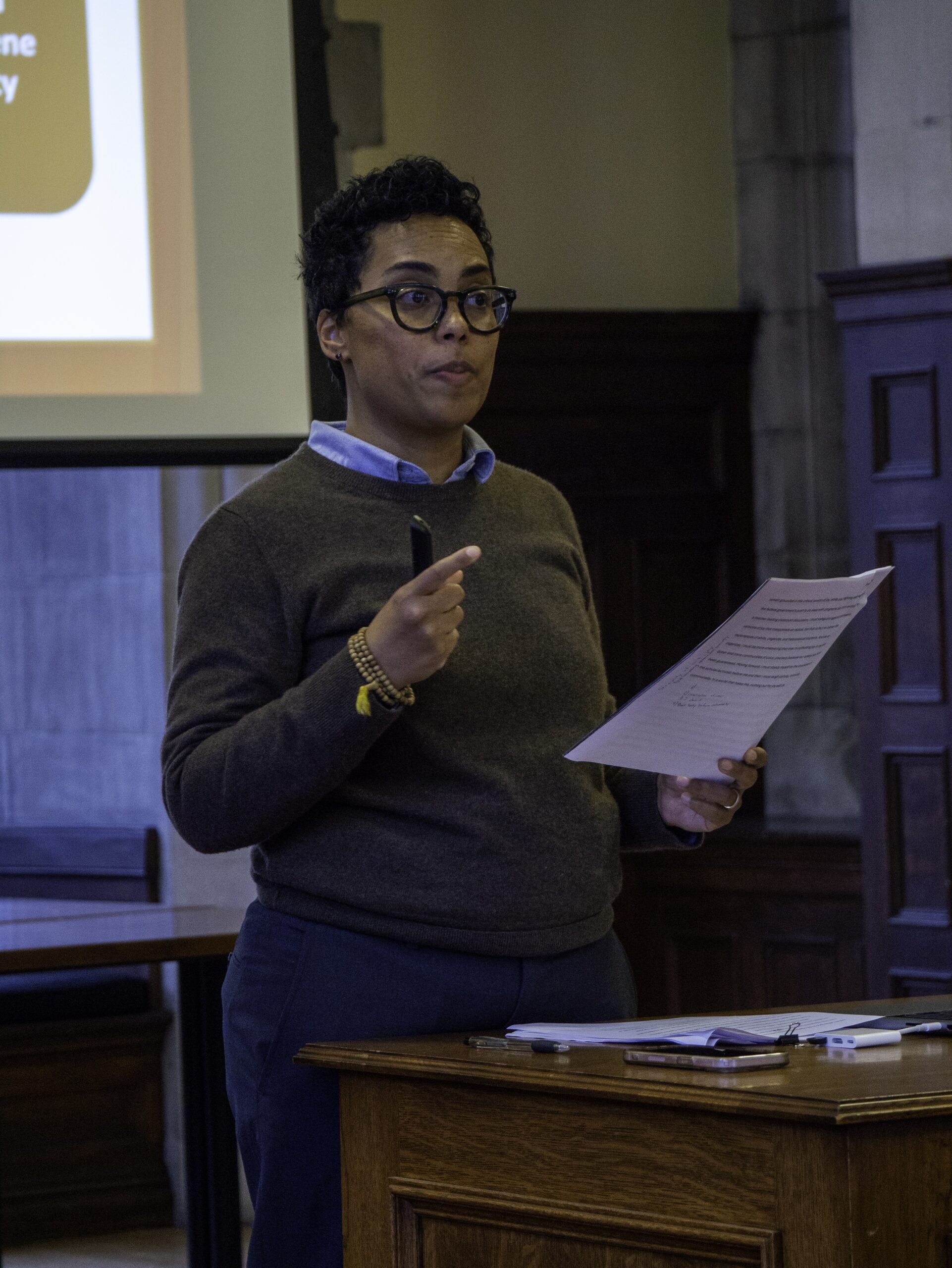Dr. Kristie Soares reveals the importance of joy in Latinx activism and today’s politics
April 11, 2025
 Isa Cruz
Isa CruzLast Tuesday, Dr. Kristie Soares visited Bowdoin to deliver a talk on the power of utilizing joy in activist efforts. The talk, titled, “Joy in Times of Crisis: Latina/x Activism and Art in the Face of the Apocalypse,” revealed how joy can be central to Latinx social and political struggle, especially within our current political climate. She began by defining critical joy studies, a term that first emerged through a set of panels at the 2023 meeting of the American Studies Association.
“Joy exists everywhere, to be sure, but those of us committed to critical joy studies are not interested in everywhere,” Soares said. “We are interested in joy’s presence and potential among the dead, the near dead, the dying.”
Soares is a performance artist, facilitator and associate professor of women and gender studies at the University of Colorado Boulder. Her recent book, published in 2023, “Playful Protest: The Political Work of Joy in Latinx Media,” traces how joy has played a part in political dissent from the 1960s to the present.
“It is unthinkable, even in our contemporary political realm, for a Latinx person to be understood as political while performing joy,” said Soares. “Because these colonial narratives have linked joy to docility and political ineptitude.”
Soares used American politician and activist, Representative Alexandria Ocasio-Cortez, as an example of how we can center joy and humor while still doing the hard work. Within a famous YouTube video by Vogue, Ocasio-Cortez talks about the political implications of beauty and self-care while laughing and doing her makeup, concretely connecting political topics with joy at the same time.
Soares’ book looks at the use of “Queen of Salsa” Celia Cruz’s iconic catchphrase “¡Azúcar!,” which translates to “sugar,” as a symbol of life and celebration. Soares mentioned how Cruz, her friends and fan base used the term to reject the norm and aspirational whiteness. In her most famous song “La Vida Es Un Carnaval” she sings: “Las penas se van cantando,” which translates to: “Your pains go away by singing,” which Soares explained is representative of the joyfulness Cruz embodied throughout her daily life and music.
Before the talk, Soares visited a LACLaS class about activism in the U.S. taught by Assistant Professor of Latin American, Caribbean, and Latinx Studies Irina Popescu. In the class, Soares explained how joy can be politicized and looked at the role of joy in photography and direct action campaigns throughout activist efforts.
In her introductory remarks in the talk, Popescu emphasized the necessity of joy in the current political moment.
“The time to center joy is always now,” Popescu said. “This moment has never felt more necessary and truer than it does for me today, as we learn how to fight against our current oppressors, how to continue surviving and celebrating our diversity.”
Alexis Martinez ’28, a student in the class who also attended the lecture, described how inspiring it felt listening to Soares’s ideas on how Latina women present joy.
“It’s such a basic concept that I feel like I’ve internalized at a young age,… not being able to show too much joy or be laughing in a situation that others would expect to be serious,” Martinez said. “Because then you’re like, ‘Oh you’re not serious enough.’ But then if you’re not too serious it’s like, ‘Why can’t you laugh?’ or ‘Why can’t you smile?’”
Soares also described how she and her students embody the political joy she speaks about through art, including a podcast, community craft nights and a Latinx disco party. She found these practices vital for understanding the joy of protest.
“These utopian politics must not be thought intellectually, but rather felt,” Soares said. “What makes utopianism useful for examining joy is that it offers us a lens through which to understand how imagining otherwise politically requires us to feel moved past the point of political pessimism.”
Soares ended the talk in recognizing the challenges that come with accessing joy and how there are moments when joy fails.
“Joy, like any habit, cannot fix the world, or at least it cannot do it alone. We must resist the urge to idealize joy, to posit it as a cure, even as we still utilize it as a political strategy during these apocalyptic times.”
Martinez reflected on her talk and reiterated the importance of knowing when joy can be an empowering tool to bring people together.
“I feel like behind every piece of activism, some form of joy, whether it’s explicit or not, is essential to the movement, like surviving and accomplishing what it needs to accomplish.”

Comments
Before submitting a comment, please review our comment policy. Some key points from the policy: